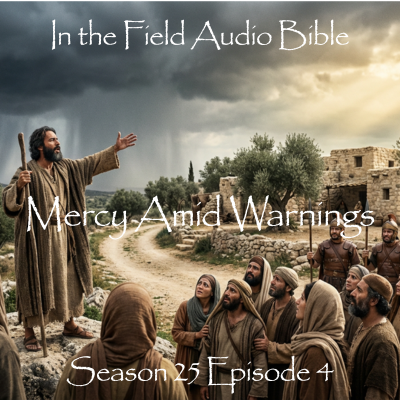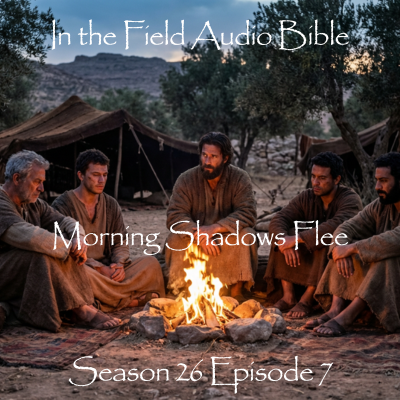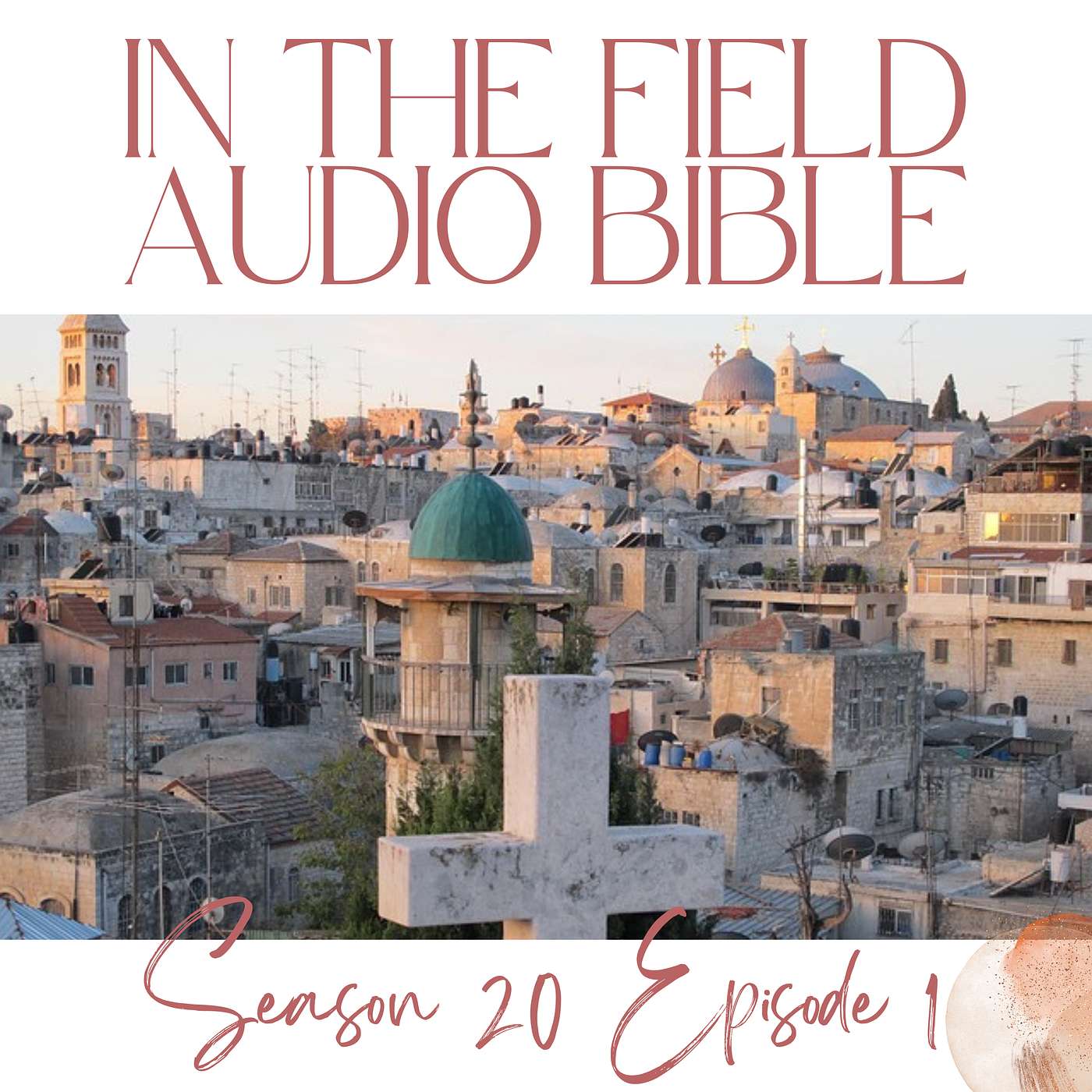Walking With Micah: What God Really Wants

What does God truly require? Not impressive rituals or grand sacrifices, but justice, mercy, and humility lived out in everyday moments. Walking with Micah, we explore a full reading of Micah 6 and discover how justice shows up in honest transactions, mercy interrupts our schedules with compassion, and humility keeps our hearts teachable. The Lord's controversy with His people exposes empty religion and calls us to faithfulness in our own corner—one choice, one act, one conversation at a time. This is a gentle reset for restless souls hungry for faith that touches real life.
A prophet climbs the ridge at dawn and calls the mountains to listen. From that arresting opening, walking with Micah, we step into Micah 6 with vivid storytelling, a full reading of the passage, and a clear, practical unpacking of what God actually wants from us—not rivers of oil, not impressive rituals, but a life shaped by justice, mercy, and humility. We explore how the Lord's "controversy" exposes dishonest scales, violent hands, and smooth tongues, and why the consequences feel like harvesting emptiness. Yet the thread of hope doesn't snap; it tightens around the promise of a Shepherd from Bethlehem and the quiet courage of everyday faithfulness.
We take these ancient words out of the courtroom and into the marketplace, the kitchen, and the neighborhood. Justice becomes honesty in small transactions and protection of the vulnerable when no one is watching. Mercy looks like releasing a debt, carrying a weight, or letting compassion interrupt your schedule. Humility turns prayer into a conversation, holds plans with open hands, and keeps the heart teachable instead of brittle. Rather than trying to fix the world, we focus on being faithful in our corner—one choice, one act, one conversation at a time.
This is a gentle but firm reset for restless souls who are tired of performance religion and hungry for a faith that actually touches real life. If you’ve wondered how to live Micah 6:8 in the pressures of modern work and family, you’ll leave with a clear next step and a lighter heart. Listen, share with someone who needs courage today, and if the message blesses you, subscribe, leave a review, and help us bring more people into this quiet, steady walk with the Word.
Music Credit: "Set for Life" by AFTR


04:01 - Journey With Micah Begins
09:11 - The Lord’s Case Against His People
13:13 - What God Requires: Justice, Mercy, Humility
15:41 - Corruption Named, Consequences Foretold
18:26 - Hope In The Coming Shepherd
22:16 - The Word Must Be Spoken
24:35 - Quiet Hearts, Sacred Text
27:50 - Micah 6 Read Aloud
31:28 - Living It In Ordinary Life
37:16 - Justice In Daily Decisions
41:36 - Mercy Costs Pride
45:36 - Humility Makes You Teachable
In the Field Audio Bible: 03:29
The morning sun climbs slowly over the Judean hills, casting long shadows across the dusty paths that wind through the terraced vineyards. You have been walking with Micah since dawn, your sandals kicking up small clouds of dust with each step. The prophet moves with purpose, his simple woolen tunic, undyed and coarse, swaying with his stride. His weathered cloak, the color of earth itself, hangs from his shoulders. His face is lined with the weight of the visions he carries. Yet his eyes burn with an intensity that has not dimmed since yesterday's prophecies.
In the Field Audio Bible: 05:39
The air is crisp, fragrant with wild rosemary and the distant scent of olive groves. Somewhere below, in the valley, you can hear the bleating of sheep being led to pasture. The land itself seems to hold its breath, waiting. Micah pauses at a rocky outcrop overlooking the valley. Below, the village of Morasheth spreads out. Flat-roofed houses of mud, brick, and stone, narrow streets where merchants are just beginning to set up their wares. Smoke rises from morning cooking fires, carrying the scent of barley bread baking on hot stones. Do you see them? Micah asks quietly, not turning to look at you. His voice is rough like wind over stone. My people, the Lord's people. He gestures broadly toward the mountains that ring the horizon—ancient, enduring, witnesses to countless generations. The Lord has a controversy, he says. And there's something in his voice that makes your spine straighten. A legal case. And he calls the mountains themselves to be his jury.
In the Field Audio Bible: 07:14
You follow Micah down a narrow path, your hand occasionally reaching out to steady yourself against the limestone rocks. The prophet moves with the confidence of a man who has walked these paths his entire life. Micah, you venture? Your voice is tentative in the morning stillness. Yesterday, you spoke of the ruler from Bethlehem, of peace coming to the ends of the earth, but now your face is troubled. He stops, turns to face you. Up close, you can see the silver threading through his dark beard, the way his calloused hands grip his walking staff. The vision of what will be does not erase the reality of what is, he says. The Lord shows me the glory to come, yes. The Messiah who will shepherd his people, but he also shows me the present corruption, the present injustice. Both are true. Both must be spoken. A group of farmers passes by, leading a donkey laden with grain sacks. They nod respectfully to Micah, but there's wariness in their eyes. Prophets are both revered and feared, bearers of uncomfortable truths. The Lord remembers, Micah continues as you resume walking. He remembers bringing our fathers out of Egypt, out of the house of slavery. He remembers sending Moses, Aaron, and Miriam. He remembers Balak, king of Moab, who hired Balaam to curse Israel, and how the Lord turned that curse into blessing.
In the Field Audio Bible: 09:27
By mid-morning, you have reached a small clearing where an ancient tree provides shade. Micah sits heavily on a flat stone, and you settle beside him, grateful for the rest. He offers you his water skin. The water is warm but welcome, tasting faintly of clay. Tell me, you say carefully, what does the Lord require? If he has a controversy with his people, what is it he wants? Micah's eyes close for a moment. When he opens them again, there are tears gathering at the corners. They ask the same question, he says softly. The people, the priest, the rulers, what shall we bring before the Lord? They think in terms of transactions, you see. They think they can buy God's favor. A merchant caravan passes on the road before, camels laden with goods, the jingle of bells, the smell of exotic spices carried on the breeze. Commerce, trade, transaction. They say, Shall we come with burnt offerings? With calves a year old? Will the Lord be pleased with thousands of rams, with ten thousand rivers of oil? Micah's voice takes on a mocking tone, though the mockery is tinged with grief. They even ask God to forgive them. Shall I give my firstborn for my transgression?
In the Field Audio Bible: 11:32
But the horror of it strikes you—child sacrifice. The abomination practiced by Israel's pagan neighbors creeping into the worship of those who should know better. But that's not what he wants. You say half statement, half question. Micah stops pacing, looks at you with something like approval. No, that's not what he wants. He sits again, his posture more contemplative. A breeze rustles through the leaves above, creating shifting patterns of light and shadow. He has shown you, O mortal, what is good, Micah says. And now his voice changes. It's gentler, almost tender. And what does the Lord require of you? You wait, hardly breathing. To act justly, Micah says, counting on his fingers, to love mercy and to walk humbly with your God. The words hang in the air between you, simply yet profound, not elaborate rituals, not expensive sacrifices, just justice. Mercy, humility. That's all? You ask and immediately regret the question. Micah smiles, but it's a sad smile. That's everything, he corrects gently. Justice, treating others with fairness, defending the vulnerable, maintaining honest weights in the marketplace. Mercy, showing covenant love, the kind of faithfulness, kindness that the Lord shows us. Humility, walking with God not as equals, but as creatures who know their place, who listen more than they speak.
In the Field Audio Bible: 13:52
You sit in silence for a while, watching the valley below. The village is fully awake now. Children playing, a blacksmith's hammer ringing, women singing as they grind grain, ordinary life, sacred life. If they lived according to what Micah has just described, but they're not doing this. You say quietly, your people, our people. No, Micah agrees, his voice heavy again. The Lord asks, "Can I forget the treasures of wickedness? Can I tolerate the scant measure that is accursed?" The rich oppress the poor. Merchants use dishonest scales. Violence fills their hands. Lies drip from their tongues. You think of the marketplace you passed through yesterday. The casual cruelty that has become so normalized that you barely noticed it. What will happen? You ask. Micah stands facing toward Jerusalem. The Lord will strike them with a grievous blow. They will eat but not be satisfied. They will sow but not reap. They will tread olives but not anoint themselves with oil. The curse of futility, labor without reward, effort without fruit. Is there no hope then? You ask, surprised by the desperation in your own voice.
In the Field Audio Bible: 15:45
Micah turns to you, and his expression softens. He places a hand on your shoulder. There is always hope, he says firmly. Did I not speak yesterday of the ruler from Bethlehem? Of the remnant that will return? Of peace that will reach to the ends of the earth? You begin to walk back toward the village, the sun now high overhead. Your mind churns with everything you have heard. The simplicity of what God requires, the complexity of how far his people have strayed. Micah, you say, How do you hold it all together? The vision of future glory and the reality of present corruption? How do you not despair? He doesn't answer immediately. You pass a woman carrying a water jar. Micah greets her by name, asks after her children. She smiles, a genuine smile that transforms her weathered face. I remember who God is, Micah finally says. Not who his people have made him out to be, a cosmic accountant tallying in sacrifices, but who he actually is—the one who brought us out of Egypt. The one who desires justice, loves mercy, and walks with us. The one who will send a shepherd from Bethlehem. You are almost back to the village now. The smell of cooking fires mingles with the earthy sense of livestock. The controversy is real, Micah says as you pause at the edge of the village. The Lord has a case against his people, but he brings the case not to destroy but to restore. He calls the mountains as witnesses because he wants his people to understand the cosmic significance of their choices.
In the Field Audio Bible: 18:05
He looks at you intently. Every act of injustice violates the very fabric of creation. They break covenant with the God who made the mountains themselves. You nod slowly, and every act of justice, every moment of mercy, participates in his redemptive work, Micah finishes, anticipates the kingdom to come, and embodies the rule of the Messiah even before he arrives. The village square opens before you, people going about their daily business, buying, selling, arguing, laughing, living. Will you speak these words to them? You ask. Micah's jaw sets with determination. I will. The Lord has given me the message. I must deliver it whether they listen or refuse to listen. And if they reject it, then at least they will have heard. At least the word will have been spoken. He pauses, then adds more softly. And perhaps one heart will hear. Perhaps one life will change. Perhaps one person will choose justice over exploitation. Mercy over cruelty. Humility over pride.
In the Field Audio Bible: 19:50
He looks at you meaningfully, and you realize he's including you in that, perhaps. The Lord has shown you what is good, Micah says again, and this time it feels personal. To act justly, to love mercy, to walk humbly with your God. The words settle into your heart like seeds planted in good soil. Micah clasps your shoulder once more, then turns toward the village center where people are beginning to gather. You watch him go. This man who carries both judgment and hope, who speaks hard truths wrapped in the promise of redemption. The mountains stand silent on the horizon, ancient witnesses to an ancient covenant. The Lord has a controversy with his people, but he also has a plan, a promise, a coming king. And in the meantime, he has shown you what is good. You take a deep breath of the warm afternoon air and follow Micah into the village square. The word must be spoken. The mountains are listening. And so perhaps are you.
In the Field Audio Bible: 21:24
Now, let's take a moment to quiet our hearts and listen to the word itself. Let these words sink deep into your spirit, bringing comfort, conviction, and encouragement. Whether you're sitting in a quiet place or out in the world, allow scripture to meet you right where you are. I hope you have your favorite cup of tea or coffee. Sit back, relax, and let's step into the sacred text of the Book of Micah 6.
In the Field Audio Bible: 22:13
The Book of Micah 6 (NRSV):
1 Hear what the Lord says. Rise, lead your case before the mountains, and let the hills hear your voice.
2 Hear, you mountains, the case of the Lord, and you enduring foundations of the earth, for the Lord has a case against his people, and he will contend with Israel.
3 "O my people, what have I done to you? In what have I wearied you? Answer me!
4 For I brought you up from the land of Egypt and redeemed you from the house of slavery, and I set before you Moses, Aaron, and Miriam.
5 O my people, remember now what King Baloch of Moab devised, what Balaam son of Beor answered him, and what happened to Shatim to Gilgal, that you may know the saving acts of the Lord."
6 "With what shall I come before the Lord and bow myself before God on high? Shall I come before him with burnt offerings, with calves a year old?
7 Will the LORD be pleased with thousands of rams, with ten thousands of rivers of oil? Shall I give my firstborn for my transgression, the fruit of my body for the sin of my soul?"
8 He has told you, O mortal, what is good, and what does the LORD require of you, but to do justice and to love kindness and walk humbly with your God?
9 The voice of the LORD cries to the city (and he shall save those who fear his name): Hear, O tribe and assembly of the city!
10 Can I forget the treasures of wickedness in the house of the wicked and the despicable false measure?
11 Can I tolerate wicked scales and a bag of dishonest weights?
12 Your wealthy are full of violence; your inhabitants speak lies with tongues of deceit in their mouths.
13 Therefore, I have begun to strike you down, making you desolate because of your sins.
14 You shall eat but not be satisfied, and there shall be a gnawing hunger within you; you shall put away but not save, and what you save, I will hand over to the sword.
15 You shall sow but not reap; you shall tread olives but not anoint yourselves with oil; you shall tread grapes but not drink wine.
16 For you have kept the statues of Omri and all the works of the house of Ahab, and you have followed their counsels. Therefore I will make you a desolation and your inhabitants an object of hissing, so you shall bear the scorn of my people.
In the Field Audio Bible: 25:56
The sun is beginning its descent toward the western hills as you stand at the edge of the village square, watching the last of the crowd disperse. Micah's words still echo in the air - to act justly, to love mercy, to walk humbly with your God. The prophet himself has moved to the shade of a courtyard wall, his head bowed in what might be prayer or exhaustion, perhaps both. You find yourself drawn back to him, your feet carrying you across the dusty square. There are questions forming in your mind, questions about how to carry these words forward, how to live them in the ordinary moments of your own life. Micah looks up as you approach, and something in his expression tells you he's been expecting you. He gestures to the ground beside him, and you sit, your back against the sun-warmed stone. You can hear the sounds of evening settling over the village, mothers calling children home, the lowing of cattle being brought in from pasture. You have questions, Micah says. It's not a question itself, just a statement of fact. I do, you admit. These words you've spoken. They're beautiful, Micah. Simple and beautiful. But I'm not a prophet. I'm just ordinary. How do I live this? How do I act justly when I have no power to change the corrupt systems around me?
In the Field Audio Bible: 27:47
Micah is quiet for a moment, his gaze distant. A young boy runs past, chasing a wooden hoop with a stick. His laughter bright and unselfconscious. Do you know what the Lord didn't say? Micah asked. He didn't say, fix the entire nation. He didn't say, "Wait until you have power and influence, then act." He picks up a handful of dust and lets it sift through his fingers. He said, What does the Lord require of you? You, singular, one person, one life, one set of choices made day after day. But what difference can one person make? All the difference, Micah says firmly. And none at all. Both are true. You cannot control outcomes, you cannot force the nation to repent, but you can control your own hands, your own heart, your own steps. And that is everything the Lord asks of you.
In the Field Audio Bible: 29:14
A woman passes by carrying a basket of figs. So if I'm a merchant, you say slowly, acting justly means honest weights, fair prices, treating the poor customer the same as the wealthy one. Yes. My good nods. Even when no one is watching, even when you could get away with cheating, justice isn't abstract. It's in every transaction, every interaction, every moment when you have the power over another person, even small power, and must choose how to use it in mercy. You ask? What does it look like to love mercy? Micah's expression softens. Mercy is remembering that you need it yourself. It's looking at the person who has wronged you, the debtor who cannot pay, and choosing compassion over vengeance, restoration over retribution. He pauses, watching as an elderly man struggles past with a heavy load of firewood. Without a word, Micah rises and helps him, taking part of the burden, walking with him to his doorway. When he returns, there's a slight smile on his face. Mercy is that, he says simply. Seeing need and responding, not because you will be rewarded, but because the Lord has shown you mercy and you extend what you have received.
In the Field Audio Bible: 31:06
You think about the grudges you carry, the debts you could forgive but haven't. It's harder than bringing a thousand rams, you murmur. Yes, Micah agrees. Because rams cost money, but mercy costs pride. Justice causes. Oh, go back to yes. Yes, Micah agrees. Because Rams cost money, but mercy costs pride. Justice costs comfort. Go back to yes. Yes, Micah agrees. Because Rams cost money, but mercy costs pride. Justice costs comfort. Humility costs the self. The light is golden now. That particular quality of late afternoon that makes everything look both beautiful and temporary. Shadows stretch long across the square. Tell me about humility, you say. Walking humbly with God. What does that mean when I'm walking through an ordinary day, not having visions like you do? Micah leans back against the wall. Humility is remembering you are not the center of the story. It's waking each morning and asking, "What does the Lord want from this day?" Rather than demanding, what do I want to do? It's holding your plans loosely, your opinions tentatively. Tentatively. Tentatively. Oh my God. Your opinions tentatively. God. Okay, go back to Micah. Micah leans back against the wall. Humility is remembering you are not the center of the story. It is waking it.
In the Field Audio Bible: 33:30
Micah leans back against the wall. Humility is remembering you are not the center of the story. It is waking each morning and asking, "What does the Lord want from this day?" Rather than demanding, what do I want? It's holding your plans loosely, your opinions tentatively, your certainties with open hands. But doesn't that make you weak? No, Micah says with surprising firmness. It makes you teachable. Pride makes you brittle. One challenge and you break. Humility makes you flexible. You can bend without breaking because you are rooted in something larger than yourself. He looks directly at you. Walking humbly with God means staying in conversation with him, not just speaking. Everyone speaks to God when they want something, but listening, waiting, being willing to hear no or not yet, or I have a different way.
In the Field Audio Bible: 34:44
You sit with that for a moment, watching the village prepare for evening. A mother wipes her child's face, two old men argue good naturally over a game of stones. Naturedly, okay, good naturedly. You sit with that for a moment, watching the village prepare for evening. A mother wipes her child's face. Two old men argue good naturedly over a game of stones. Life in all is that you sit. You sit with that for a moment, watching the village prepare for evening. A mother wipes her child's face. Two old men argue good naturedly over a game of stones. Life in all its ordinary sacredness. Micah, you say slowly. I think I've been making it too complicated. I have been thinking about religion, about what to do. Oh, go back to Micah. Micah, you say slowly. I think I have been making it too complicated. I have been thinking about religion, about what to bring to God, what rituals to perform. But you are talking about something else entirely. Yes, Micah says, and there's approval in his voice. Religion can become a way of keeping God at arm's length. Here's my offering. Now leave me alone. But what the Lord wants is not your gifts. He owns the cattle on a thousand hills. What he wants is you, your choices, your character, your companionship. Justice, mercy, humility, you repeat. These aren't add-ons to faith. They are faith. Now you understand, Micah says. Faith without justice is empty ritual. Faith without mercy is cold orthodoxy. Faith without humility is just pride wearing religious clothing.
In the Field Audio Bible: 37:50
The call to evening prayer drifts across the village. People begin moving toward their homes, toward the small family altars where they will offer thanks for the day's bread. You stand, brush the dust from your cloak. So I go back to my ordinary life. Back to the marketplace, the family, the daily work. But I go differently. Yes, Micah says, rising beside you. You go as someone who has heard what the Lord requires. You go knowing that every act of justice or injustice matters. That every moment of mercy or cruelty is seen. That every step of humility or pride is noted, that sounds heavy, you admit. But it's also free because you are not trying to earn God's favor. You already have it. You are simply responding to what He has already done. You are living as someone who has been shown mercy and therefore shows mercy. Someone who has received justice from God and therefore pursues justice for others. The first stars are beginning to appear in the darkening night. The smell of evening meals cooking, lentil stew, and fresh bread. It makes your stomach rumble. Will it be enough? You ask. My small acts of justice in a world full of corruption? My small mercies in a world full of cruelty?
In the Field Audio Bible: 39:39
Micah places both his hands on your shoulders, looks you in the eye. It will be enough for today, he says. And tomorrow, it will be enough for tomorrow. The Lord doesn't ask you to fix everything. He asks you to be faithful in your corner of the world, with the people he's placed in your path in the moments he has given you. He releases you, steps back. The ruler from Bethlehem will come. The kingdom will be established. That's God's work, and he will accomplish it. Your work is simpler and harder. To act justly today, to love mercy today, to walk humbly with your God today. You nod slowly, feeling the truth of it settle into your bones. Thank you, you say. You turn toward home, your shadows stretching long before you in the fading light. Behind you, Micah begins his own evening prayer, his voice low and steady. Ahead of you, the path winds through the village, past the houses where families are gathering, past the well where tomorrow morning the women will come to draw water.
In the Field Audio Bible: 41:28
Ordinary places, sacred spaces, if you have eyes to see them. The mountains stand silent on the horizon, witnesses to the covenant. The Lord has spoken his requirement. Not complicated, not impossible, not distant. Go back to the mountains. The mountains stand. The mountains stand silent on the horizon, witnesses to the covenant. The Lord has spoken his requirement. Not complicated, not impossible, not distant. Act justly, love mercy, walk humbly with your God. Three things, everything. A lifetime's work that begins with a single step. You take that step, and then another. The path is ancient, worn smooth by countless feet before yours, but it's also new because these are your feet, your choices, your life. The word has been spoken, the mountains have witnessed, and now, now you must walk. Not perfectly, not heroically, just faithfully. One step at a time. All the way home.
In the Field Audio Bible: 43:29
Thank you for joining me today as we journeyed through the Book of Micah 6. I pray that you carry these reflections with you into your day, into your week, and that you find strength in knowing God is with you in every trial, every temptation, and every step of obedience. If this time in God's word has encouraged you, take a moment to share it with someone who might need it. And be sure to join me next time as we continue walking through the scriptures, learning, growing, and staying faithful in the field of life. Until next time, may you find peace in the quiet, trust in God's call, and rest in his unchanging love. This is In the Field Audio Bible, where we Listen to the Bible One Chapter at a Time.





















